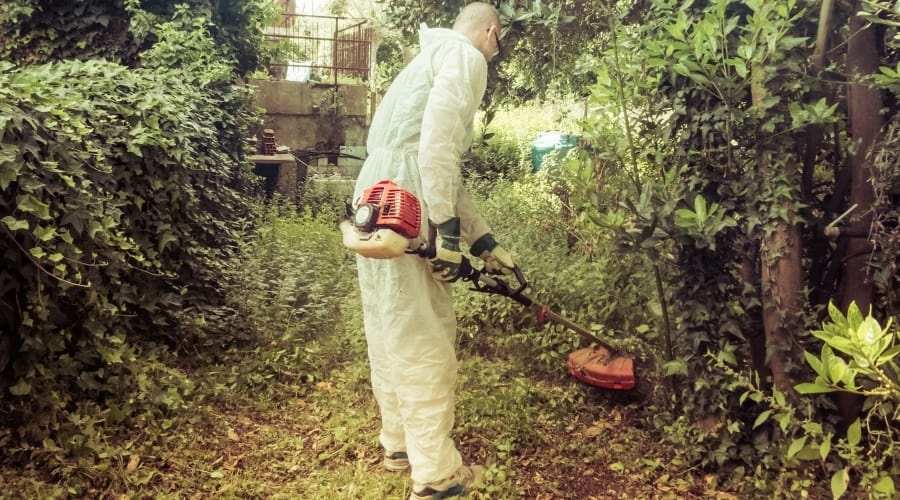Can you use a Brush Cutter in the rain? It’s not the best scenario, but some regions get so much rain that it’s hard to find a time when it isn’t raining outside. Under these circumstances you may not have a choice in the matter.
Using a brush cutter in the rain is not recommended, however it can be done if you’re using a gas-powered model only. Rain can cause damage to the brush cutter by soaking the air filter and overheating the motor. If you use an electric powered brush cutter, moisture can get inside the wiring and cause an electrical short.
Although it’s best to use a brush cutter in dry weather, it’s not always an option. This guide tells you everything you need to know about using a brush cutter in the rain.
I’ve written it for homeowners who have no choice but to work in the rain, what to be aware of, potential risks and drawbacks, how to stay safe, and cut brush the most effectively under adverse conditions.
Table of Contents
Using A Brush Cutter In The Rain
Prepare yourself for a different brush cutting experience if you must do so in the rain. Vegetation is heavier and it is less likely to cut smoothly when it is wet.
A dry brush snaps more easily, but when it’s soggy, it tends to resist breakage from the cutter, pulling the weeds and brush out of the ground more easily.
You will need to make adjustments in the methods you use for brush cutting in the rain.
1 – Use The Brush Cutter Higher Off The Ground
Use the brush cutter at a higher level from the ground to avoid pulling the vegetation out in clumps. Moistened ground causes roots to be pulled up from the ground more easily when the brush cutter is too low.
Try to cut it low enough without getting too close to the ground.
2 – Use A Sideways Swinging Motion
Fire up the brush cutter and swing the cutting head at the weeds in a slightly angular swinging motion. Keep it moving to prevent the extra weight from the moisture from bogging it down and causing it to bind in heavy vegetation.
3 – Use High Speed
It’s best to use a higher speed for a heavier impact on wet brush when using a brush cutter in the rain. This is only necessary if it’s a moderate to hard rain that soaks the vegetation.
If the rain is light and there is little moisture, you can safely use lower speeds without bogging down the cutter. It’s situational and you’ll need to make the assessment based on the amount of moisture.
4 – Brush Cutting Wet Grass
Wet grass is heavier and more supple than it is on a dry day. It makes cutting more difficult as the grass tends to bend and stretch more.
Look out for grass that binds up more easily in the brush cutter or wraps around the rotor of the cutter. Another issue is that the grass is more easily pulled out of the ground by the roots when it is wet.
Getting the cutter too low to the ground can result in destruction of the plants. You must take extra care when cutting wet grass.
It’s not recommended, but if you can’t wait until it’s dry outside, follow the tips for using a brush cutter in the rain above to protect your vulnerable grass from damage.
Can You Damage Brush Cutter If It Gets Wet
High quality brush cutters are less likely to sustain damage if they get wet. However, it is possible to cause damage to your equipment if it becomes saturated.
There are several things that can happen to a brush cutter when it’s used in a rainstorm. It’s essential to know that you can damage a brush cutter if it gets wet, but there are some things that you can do to prevent serious damage from occurring.
Let’s look at the risks for causing damage.
Soaked Air Filter
The air filter in your brush cutter can become soaked with water if you’re using a gas-powered unit. This can cause it to plug up with mud and other kinds of debris.
It can cause the motor to shut down and not start up again until the filter is cleaned and dried. Wet air filters do not allow the air to circulate through them. This situation can also lead to overheating and damage to the motor.
Electrical Short Out
If you’re using an electric power brush cutter, which is never recommended in the rain, the moisture can get inside near the wiring. It can cause an electrical short. This could permanently damage the motor and ruin the brush cutter.
Oxidization Of Metal Components
Metal components that are exposed to excessive moisture can oxidize or rust. If your brush cutter gets wet, dry it after using it in the rain to extend the life of metal components.
Overheating The Motor
Cutting brush that is wet puts an extra strain on the motor of a brush cutter. You may need to take more frequent breaks if you notice that the unit is overheating. Allow it to cool off before continuing the job to prevent damage to the motor.
Safety Tips For Brush Cutting In The Rain
It’s best to avoid using a brush cutter in the rain whenever possible, but if you have no other alternative, there ae some things you need to know about safety when using a brush cutter when it’s wet outside.
Here are four tips to observe to prevent serious injury or worse.
- Only use a gas-powered brush cutter in the rain. Electric brush cutters are dangerous in the rain and can cause electrocution when there is excess moisture on the ground and falling from the sky.
- Be careful of slip and falls. Keep a solid footing underneath you. The grass is more slippery when it is wet and it’s easier to slip and fall, causing injury or cutting yourself with the brush cutter. If you do slip and fall, keep the cutting part of the brush cutter aimed in a direction away from your body, and kill the power.
- Keep the cutter a little higher off the ground and cut at an angle. It’s easier for the cutter to get bogged down when the grass is wet.
- Keep the cutter at a higher speed. Wet grass can get pulled out by the roots easier when the ground is wet. To avoid this situation, run the brush cutter at a higher speed and cut at a higher level at a slight angle. Be careful to stop the cutter if the grass begins to wrap around the rotor.
Helpful Tips To Know About Using A Brush Cutter In The Rain
You can use a gas-powered brush cutter in the rain more safely than an electric version. There are still precautions that need to be taken to maximize the use of the cutter in the rain and prevent damage from occurring to the plants you’re cutting or to the brush cutter
- Watch for signs of overheating. Turn the cutter off if the motor gets too hot and allow it to cool down.
- Watch out for grass wrapping around the rotor and binding the cutter. Use the recommended methods to help prevent this when the grass is wet.
- Keep the brush cutter clean and clear of debris. This includes grass that might wrap around the rotor or buildup of moisture and mud in the air filter, if applicable. Clean the air filter and dry it to prevent damage to the motor.
Final Thoughts
Using a brush cutter in the rain is not recommended, but it can be done if you’re using a gas-powered model. Using an electric powered brush cutter is far too dangerous because of the risk of electrocution for the user.
The most important things to know before you start, are the risks and how to lessen the chances of damaging the plants you’re cutting, how to prevent damage to the brush cutter, and how to prevent personal injury from using a brush cutter in the rain.
The information and tips about how to use a brush cutter in the rain are intended to equip you with the knowledge you need before you start.
It’s recommended that you read through the manual that comes with your brush cutter for other tips that the manufacture may have provided regarding using this equipment when it’s raining outside.
If you follow the tips and recommendations, you should be able to use your brush cutter on rainy days without any big problems.

